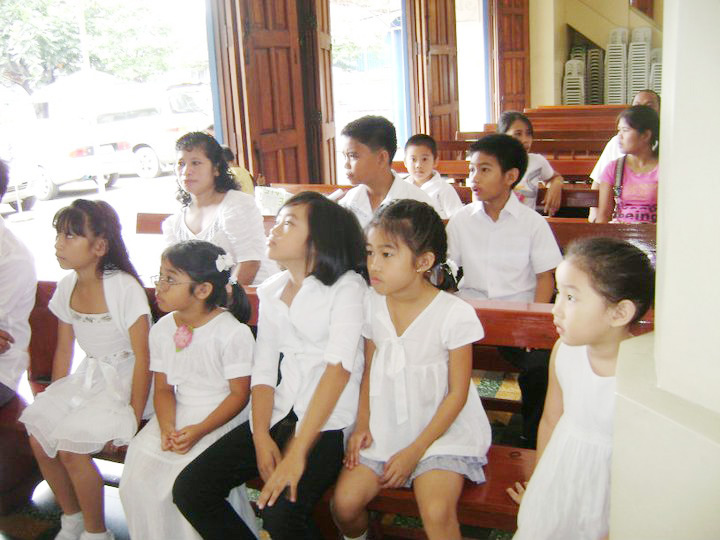Summary
For homeschooling mother Merideth Sanico, success is seeing her two children learn not only their academics but more importantly, the lessons of life.We have homeschooled our son and daughter since Kindergarten and we have every reason to believe that they are happy being homeschooled.
They have never joined any traditional classes, except for certain summer courses in sports, music, and their regular dance classes and piano lessons.
My son, John David (Jod), is currently enrolled in Grade 7 with Seton. Dara Monica (Dara) is in Grade 4. For our family, success in homeschooling is seeing our children develop the habit of learning – learning not only their academics but more importantly, the lessons of life.
Seeing them develop a joy of learning is an achievement in itself, as far as my husband and I are concerned.
We watch them pursue the things that interest them and develop their God-given talents, knowing that these children are God’s blessings and that doing these things will help them fulfill their primary aim, which is to pursue God’s will for their lives.

In our family, we believe that homeschooling success equals love of learning, and we have seven pillars on which this success is built.
Planning
As a parent-teacher, I try as much as possible to use Seton’s Teacher’s Plan Book. There, I write the student’s daily goals for each subject every day. For Dara (my 9-year old daughter), we cover almost all of the subjects daily, except for Music, Arts, and PE.
My son Jod prefers to do specific subjects on certain days (let me explain this arrangement later). The goals I set for each day depend on the pace of the student. Fridays are our Music and P.E. day. On that day, we shrink the goals for some subjects and do not set any goal at all for other subjects.
This allows us to travel to the kids’ piano lessons and ballet classes.
Following a Schedule
We go through the school day in the order of the subjects I laid out in the Teacher’s Plan Book. This order is either agreed to between the parent and the student (as is the case with my son who is in junior high, or as my husband and I deem appropriate (as is the case with our elementary student, Dara).
In both cases, the first subject of the day is the most interesting one for the student.
For example, Dara loves to read, so we start our day with Reading, then follow it with Spelling (a challenging subject for her). Then, we spread the other subjects, putting the easiest subject in the last period. Normally, Handwriting is the last subject, but sometimes, we forgo Handwriting when other goals for the day require her to do “heavy” writing..

As a junior high school student, Jod is allowed to decide how he approaches each course. This year, he has divided his subjects into two groups. There are subjects that he does on Tuesdays and Thursdays only and there are subjects that he does only on Mondays, Wednesdays, and Fridays.
This arrangement allows Jod to accomplish more in each subject. For example, he can finish a chapter for History or Science in one day, highlight important notes in the book, and review and prepare for the quiz all in the same day.
To be clear, there are certain subjects, like English and Math, that he does every day because we believe that daily practice is needed for success in these subjects. These arrangements are the basis for preparing the daily goals in the Teacher’s Plan book.
Start time depends on the activities of the family the night before.
We attend a Catholic prayer meeting on Mondays, so I am a little bit lenient on Tuesdays. However, we have an unwritten rule: Each student must finish his/her study goals first, before he/she can have a privilege (for Dara, playing outside and watching a video; for Jod, playing his favorite video game or practicing his piano pieces).
We always ensure that any computer/video activity for the day is limited to an hour.
Prayer
We start each school day with prayer. We usually pray the “Morning Offering.” It is our way of giving to Our Lord our entire day – offering to Him our prayers, works, joys, sufferings, our studies to Him. Spontaneous prayers are added when we deem it necessary.

National Anthem
After the prayer, we sing “Lupang Hinirang,” our Philippine National Anthem, followed by the “Panunumpa Sa Watawat” (pledge of allegiance to the flag). We hope that by including these practices, we can instill in our children a love for country patriotism.
Practicing this daily also helps our children shift from “relaxed mode” to “learning mode”.
Contentment
We believe that whatever the kids have learned for the day is what the Lord wants them to learn that day. What is important is that they have learned to discipline themselves by following the daily goals. However, when the student experiences some difficulties along the way, we adjust our approach.
We also believe that learning is not just limited to academics, so we incorporate the house chores, such as washing the dishes after lunch and dinner, hanging washed clothes, folding clean clothes, sweeping the floor, watering the plants or cleaning up our respective work areas.
These are times when we can talk with the children about life lessons, which is one of the great goods of homeschooling.
We get the chance to talk with our children about the more important things in life.
Sacraments and More Prayers
As a parent, I have my personal daily devotions. One of them is the prayer for my children, which I do daily using the prayers in the book, “Power of a Praying Parent” by Stormie Omartian. These prayers cover nearly all my concerns for my children.

During the day, especially when I feel overwhelmed, I pray the “Parents’ Prayer for Their Children” by Pope Francis. Aside from the Sunday Masses that we go to as a family, my husband and I attend Masses during the weekdays, when possible. We also schedule and go to our monthly confessions as a family to encourage our children to embrace the sacrament.
Love and lots of love
Finally, we believe that children cooperate better, learn better, and mature more confidently when they feel loved, so we take care to show them this constantly throughout the day. Different children have different love languages, so we work hard to demonstrate our love based on each child’s own love language.

I am blessed to be working from home and am able to actively involve myself with my children’s homeschooling. In doing so, I learn along with them, recall what I have learned before and discover new things.
I thank God for this wonderful opportunity to do what He has called me to do – live my vocation as mother to the children He has given us.

 Seton Magazine Catholic Homeschool Articles, Advice & Resources
Seton Magazine Catholic Homeschool Articles, Advice & Resources
